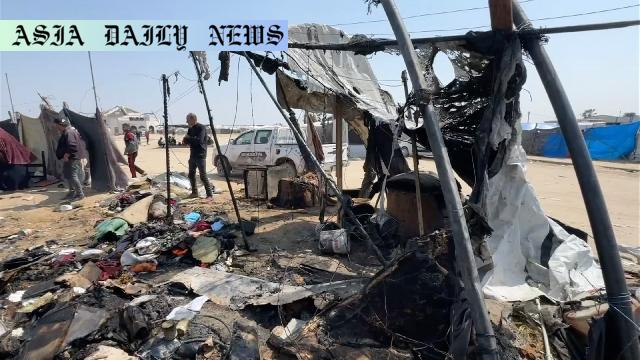Airstrikes: Residents of Khan Younis face severe challenges in the wake of devastating Israeli airstrikes amid alleged ceasefire violations.

The Immediate Impact on Khan Younis
The residents of Khan Younis, a southern city in the Gaza Strip, are facing unprecedented challenges following airstrikes carried out on Tuesday by Israeli forces. Footage provided by NHK’s Gaza office paints a stark picture of destruction and despair. Tents that had been home to evacuees burned in the onslaught, forcing many families, already displaced, to continue seeking shelter. The loss goes beyond material damage: civilians, including children, have faced grievous injuries from shrapnel, with some requiring intensive care. Local residents described the aftermath as harrowing, highlighting the sheer scale of devastation inflicted on their community.
Among those personally affected, a resident recounted his ordeal, sharing the painful fact of his son’s injury and his nephew being placed in the intensive care unit. These human stories highlight the deep physical and emotional scars inflicted on the population, with some families losing both loved ones and access to safe shelter.
Broken Ceasefire and Rising Tensions
There has also been significant fallout from allegations concerning the violation of the ceasefire agreement. A local man expressed his shock over the escalation, noting that the bombings were relentless and made the area feel like a battlefield akin to “hell.” Such a breach undeniably brings the commitment to diplomatic resolutions into question while fueling broader tensions in the region. As the dust clears, residents are questioning whether promises of peace and ceasefire agreements can be trusted.
The attack on Khan Younis underscores the precarious state of Gaza’s residents while raising concerns over renewed cycles of violence and instability. Many are now left wondering when peace will become a viable reality given these developments.
Mass Displacement and Humanitarian Crisis
As reports of additional evacuation orders have surfaced, thousands of residents are being forced to leave their homes across Gaza’s already besieged territories. Footage of families struggling to haul their belongings highlights the magnitude of the humanitarian crisis emerging from these circumstances. Some fled using makeshift transportation modes, such as donkey-driven wagons, as they carried personal items in an attempt to salvage whatever possible.
Unsurprisingly, this situation has left many without access to basic infrastructure, creating an immediate need for shelter, food, and medical supplies. Humanitarian efforts face tremendous challenges in addressing these dire necessities, particularly in light of ongoing airstrikes that complicate relief operations.
The scenes in Khan Younis underscore the urgent call for international action to protect civilians caught in a rapidly deteriorating conflict. The world must provide aid and advocate for sustainable peace solutions to prevent further escalation in one of the globe’s most sensitive regions.
Call for Accountability and Justice
The repeated violence in Gaza reveals a persistent lack of accountability on a global scale. Critics have called on the international community to do more to not only mediate peace but also hold stakeholders accountable for ceasefire violations and strikes that directly harm civilians. Khan Younis serves as a grim reminder of the human cost of such conflicts.
Statements from residents serve not just as testimony to the events but also as a call to action from a region long plagued by volatility. Human rights organizations have echoed these sentiments, urging all parties to abide by international law and ensure civilians are safeguarded.
The unfolding crisis in Gaza warrants immediate attention, as further inaction will lead to heightened devastation and entrenched inequalities that undernourish hope for peace.
Commentary
The Cost of Conflict on Civilians
Reflecting on the latest developments from Khan Younis, it becomes painfully evident that civilians bear the greatest burden in times of conflict. The reports of families losing their homes, loved ones, and access to basic necessities illustrate the deep human cost of hostilities. Moments like these challenge us to ask ourselves whether the ultimate price of war is ever justifiable. These individuals, already vulnerable in a volatile region, deserve not only our empathy but our actionable support.
From burned tents to the pain of personal injury, every story coming out of Khan Younis speaks of resilience in the face of despair. It is difficult not only to witness such loss but also to reconcile it with the prospects of peace. As the dust clears, the psychological toll on these communities will linger far longer than the immediate damage of the bombings.
The Role of International Oversight
The reported violation of a ceasefire agreement not only escalates tensions but calls into question the efficacy of international oversight and diplomacy. If agreements meant to foster peace can dissolve so easily, what deterrents are in place to prevent future violations? The international community has a crucial role to play in holding parties accountable, ensuring that all actions are in accordance with humanitarian principles. Efforts must focus on preventing further violence and fostering trust to pave a pathway toward long-term stability.
Khan Younis is not just an isolated incident but a microcosm of a broader, systemic crisis within Gaza. It is a reminder of the critical need for diplomatic engagement and, importantly, sustainable resolutions.
Humanitarian Responsibility and Hope
Aside from geopolitical implications, the immediate priority needs to be the welfare of the affected populations. A collaborative humanitarian response is necessary to provide urgent aid to the displaced, from medical care to shelter and food supplies. The staggering loss and suffering demand efficient and compassionate global action.
Despite the bleakness of the situation, hope and resilience remain the most valuable resources in rebuilding. Communities like Khan Younis have shown incredible endurance despite dire odds. As they work toward recovery, it is incumbent upon the global community to support these efforts, for their hope is a rallying cry for peace in the region.
Ultimately, the destiny of Khan Younis lies not just in its people but in the collective will toward justice, accountability, and peace.


